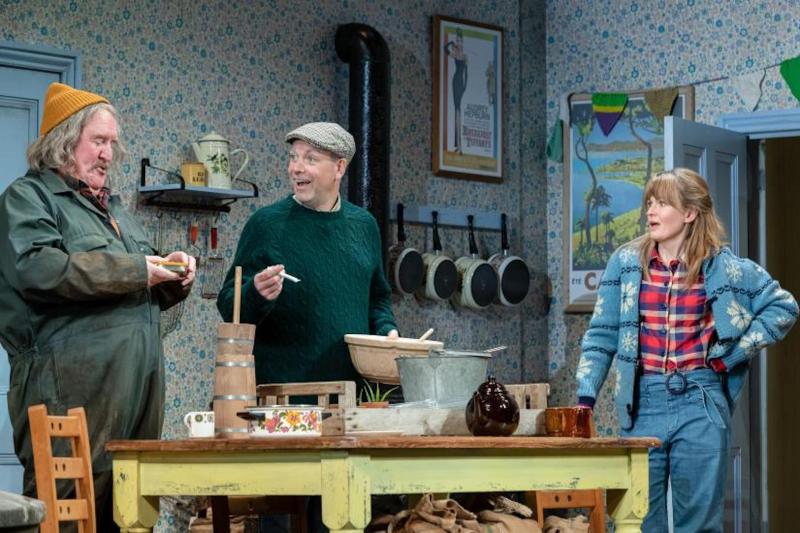The Good Life, Richmond Theatre review - popular sitcom gets its own origin story | reviews, news & interviews
The Good Life, Richmond Theatre review - popular sitcom gets its own origin story
The Good Life, Richmond Theatre review - popular sitcom gets its own origin story
Tom, Barbara, Jerry and Margo are back in the '70s, but with a message for today

"Off-grid" wasn't a thing in the mid-'70s. Sure, people planted a few potatoes in the garden and pottered about a bit in an allotment, but nobody went the whole hog. The rat race was certainly a thing though, a fertile seam for comedies like The Fall and Rise of Reginald Perrin.
The veteran writer-director Jeremy Sams takes us back to Tom and Barbara’s momentous decision to live off the land - in Surbiton - and their love-hate relationship with next door neighbours, ad exec Jerry and snooty Margo. Sams finds the easy laughs that come with the appalling fashions of the time (designer Michael Taylor knows “Man At C&A”) and makes some rather gentle points about the consumerist society that has galloped on apace since those more innocent times.
 Not all of it works. The plot of the first half is driven by the tired old cliché of a cake spiked with marijuana (not a story that would run on primetime in the show’s heyday) and the second half strains credibility, as saving a piglet becomes a matter of life and death in southwest London on a Saturday morning and am-dram rivalries cast a long shadow.
Not all of it works. The plot of the first half is driven by the tired old cliché of a cake spiked with marijuana (not a story that would run on primetime in the show’s heyday) and the second half strains credibility, as saving a piglet becomes a matter of life and death in southwest London on a Saturday morning and am-dram rivalries cast a long shadow.
It doesn't matter much given that the laughs are generated primarily by the interaction of the characters. Rufus Hound captures Tom’s Perrinish sudden moment of being “mad as hell and not going to take it any more”, years of disillusion boiling over, followed by the relief of quitting the whole damned thing and then the edge of anxiety peeping through. Sally Tatum is down to earth and flirty as Barbara, although it’s pretty clear that her energy is being pushed by a biological clock that ticks ever louder in her ear.
It’s the Leadbetters who provide the engine that generates most of the laughs. Dominic Rowan (pictured above with Preeya Kalidas) is splendid as Jerry, every inch the middle-manager in his tastes (exotic food and drink was rather different when the local supermarket was a Fine Fare) and his tiny rebellions against his wife are beautifully judged. Preeya Kalidas gets the plumb role of Margo, and delivers it so well that I almost forgot the unforgettable Penelope Keith. Margo is a bullying monster, but she needs a certain vulnerability and charm to leaven the outrageous snobbery and Kalidas gets that just right.
There’s room for a few cameos of cardboard cutout characters delivered with skill by Nigel Betts and Tessa Churchard, and they elicit their fair share of laughs, overly familiar though they may be.
After an agreeable if hardly demanding couple of hours, you leave the theatre and resolve to think little more about it… and then a few unexpected points dawn on you.
I was a working class teenager when the series was first shown - the principals were my parents’ age - and the travails of eccentric middle class Londoners held precisely zero interest for me, the twee title sequence and tinkling theme music enough for me to leave the room or switch channels to World in Action or On The Buses (I was that desperate). Now, a decade or more older than the two couples, I see Tom’s near nervous breakdown, Barbara’s childlessness, Jerry’s resigned compliance with his wife's control-freakery and Margo’s middle-aged status anxiety in a different light. It’s no Chekhov, but there’s real psychological damage as well as a dawning environmental awareness driving the universality of the comedy.
Perhaps that’s why it’s as well loved today as it was all those decades ago.
The future of Arts Journalism
You can stop theartsdesk.com closing!
We urgently need financing to survive. Our fundraising drive has thus far raised £49,000 but we need to reach £100,000 or we will be forced to close. Please contribute here: https://gofund.me/c3f6033d
And if you can forward this information to anyone who might assist, we’d be grateful.

Subscribe to theartsdesk.com
Thank you for continuing to read our work on theartsdesk.com. For unlimited access to every article in its entirety, including our archive of more than 15,000 pieces, we're asking for £5 per month or £40 per year. We feel it's a very good deal, and hope you do too.
To take a subscription now simply click here.
And if you're looking for that extra gift for a friend or family member, why not treat them to a theartsdesk.com gift subscription?

Add comment